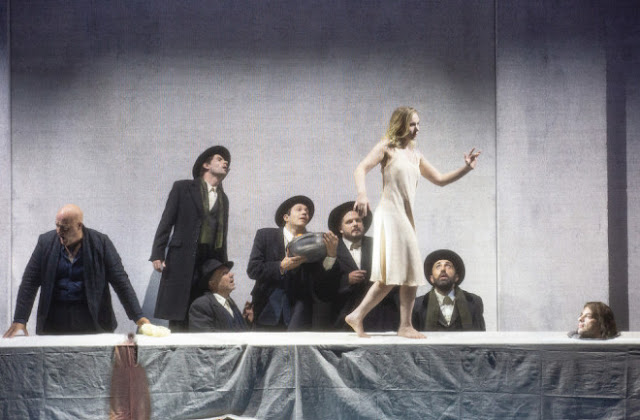Festival d'Aix-en-Provence, 19/07/2022
Strauss : Salome
Orchestre de Paris
Ingo Metzmacher
This was yet another production that made little sense to me, save to ensure that the spotlight was very fairly on the title role. This was, I think, not merely because Andrea Breth felt that it should be, but also because of the casting, for Elsa Dreisig had to be pretty low down on the list of possible Salomés. She's a lovely singer, but it's not the fach habitually associated with the part, her voice is much lighter. On the other hand, this is clearly becoming the new thing, viz Asmik Grigorian's success in the same part (though she wasn't quite so much out of left field as Dreisig). So we had a production in black and white, and for no good reason that I could discern, all of it behind a scrim, which has deleterious effects both on one's vision, and hearing of whatever is going on behind. Otherwise we had dark and light spaces, the dark with a floor that could break and/or rise up at any given moment, and the moon always visible. The light was mainly the interior of Herod's palace, and a long table with guests that gave an impression of Leonardo's Last Supper, but with the peculiarity of Jokaanan's head already being on the table. Salomé's final scene was also delivered in a 'light' space, a tiled, but dilapidated rectangle that made me think of a prison shower room. Costume was indefinite-modern, mostly in dark colours save for Salomé's blush-pink slip dress.
 |
| John Daszak (left), Elsa Dreisig (centre) and Gábor Bretz (right, head only) Salome, Aix-en-Provence Festival (© Bernd Uhlig, July 2022) |
With such a silvery-voiced interpreter, the aspect of Salomé was rather that of the fundamentally innocent young girl, awakening to desire, rather than the perverted femme fatale. Again, it's not wrong, it's almost certainly what Strauss, and probably Wilde, had in mind, and the other view came about largely because of the performers available at the time. It's impossible to cast Salomé to age, no 16-year old could possibly sing this role, so you inevitably get sopranos whose physical type simply can't adapt to that, no matter how well they can sing it. Dreisig, at 30, is probably the youngest Salomé I've ever seen, if she wasn't quite an adolescent, she was certainly a very young woman, her vocal timbre wonderfully fresh and clear.
Conductor Iago Metzmacher was also assisting as much as possible by keeping a tight rein on the effusions of the orchestra, and using the slightly reduced 1929 orchestration, rather than the massive forces of the original 1907 score. The downside, however, was that restraint carried through to the characterisation on stage. Even accepting Salomé as an ingenue, her reaction to Jokaanan has to be utterly visceral and overwhelming, else why her excessive reaction to his rejection, and if everyone is holding back because the soprano cannot dominate the orchestra at the crucial moments, you never get that punch to the gut of her rising obsession. Dreisig was very good, and a pleasure to listen to, but she didn't grab me by the throat, and in consequence, nor did anyone else. With the production so focused on her, the other characters seemed a little under-nourished, and John Daszak, who is one of the very best character tenors on the circuit, seemed a little wasted as Herod. Gábor Bretz was a respectable Jokaanan, not quite as sonorous as I like them to be, but quite sure, while Joel Prieto was an earnest Narraboth. Angela Denoke delivered an impressive Herodias, emphatic and harsh, but never insignificant.
Finally, the care Metzmacher brought to the orchestra was also impressive, as was the transparency of sound of the Orchestre de Paris, but they felt hobbled to me, rarely able to really let go with Strauss's opulent orchestration.
[Next : 20th July]
